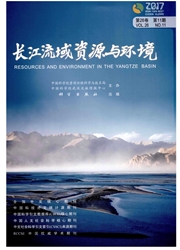

 中文摘要:
中文摘要:
实现土地集约利用水平提高与土地利用碳减排的双赢,是我国土地管理者的期望。先是测算了湖北省3个中心城市1996-2010年的土地集约利用水平和土地利用碳排放值,对两者关系进行了理论分析与假定,最后通过协整检验、Granger因果关系检验和脉冲响应函数的计量方法验证了理论分析。结果表明:土地集约利用水平与土地利用碳排放存在长期均衡关系。在土地利用资本集约阶段,土地集约利用增加作为碳源的建设用地碳排放量效果明显大于保育农用地等碳汇的碳吸收量效果;不同土地集约利用阶段的土地集约利用水平和土地利用碳排放的关系呈动态变化,技术进步将成为改变两者正相关关系的关键;在土地利用的资本集约阶段,提高土地集约利用水平会促进土地利用碳排放增加,但随着城市经济发展转型及产业集聚特征的变化,土地集约利用水平的提高对碳排放的正向影响将减弱。最后,根据研究结果提出了中心城市的土地低碳集约利用策略。
 英文摘要:
英文摘要:
Achieving a win-win situation between improvement of land intensive use and carbon emission is the expectation of the Chinese land managers.Firstly,we calculated the level of land intensive use and land use carbon emission in the central cities,then we performed theoretical analysis and made assumptions to describe the relationship between them using the documentary method.We used the methods of cointegration test,granger causality test and impulse response function to verify the theoretical analysis based on the panel data of three central cities in Hubei Province in 1996-2010.The results showed that there was a long-term equilibrium relation between the level of land intensive use and carbon emission of the three central cities in Hubei Province.Research conclusions can be listed as follows.Firstly,in the capital intensive stage of land use,the effect of land intensive use on increasing carbon emission of construction land as carbon source is significantly greater than the effect on conservation carbon sink of the agricultural land.Secondly,the relationship between the level of land intensive use and carbon emission changed dynamically in different stages of land intensive use.Advances in technology is the key to change the positive correlation between land intensive use and carbon emission,and it would be the breakthrough to achieve a win-win situation between improvement of land intensive use and carbon less emission.Thirdly,in the stage of land intensive use,the improvement of the level of land intensive use would promote the increase of land use carbon emission,but,with the transformation of the city industry characteristics and economic development,the response of carbon emission to land intensive use would be weak.Finally,the strategy of land low-carbon and intensive use was proposed based on the research conclusions.
 同期刊论文项目
同期刊论文项目
 同项目期刊论文
同项目期刊论文
 期刊信息
期刊信息
